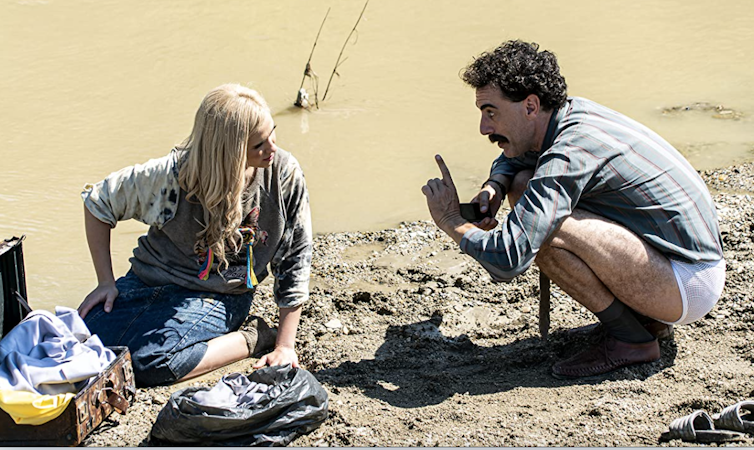Source: The Conversation (Au and NZ) – By Alex Cothren, PhD Candidate, Flinders University
It’s January 20th, 2021. Inauguration day. A triumphant Joe Biden salutes the National Mall crowd (way bigger than the last guy’s) and dedicates his victory to Sacha Baron Cohen, aka Borat, the satirical mastermind who delivered the knock-out blow to Trumpism.
Released on Amazon Prime Video in the shadow of the looming U.S. election, Borat Subsequent Moviefilm is a wet firecracker of an October Surprise.
Cohen reprises his role of the smiley, Jew-hating journalist from Kazakhstan, a real country no American ever seems to have heard of. His latest mission: bribe someone close to Trump with the gift of his 15-year-old daughter (played by brilliant newcomer Maria Bakalova).

Most hopes are pinned on a compromising scene involving Rudy Giuliani and Bakalova, with the former posing as a giggly reporter whose interview transitions into a bedside fondle.
It is undeniably disturbing to watch Giuliani get handsy with both Bakalova’s backside and his own crum. However it’s hard to believe that those mythical undecided voters will give a hoot. Like his boss, Giulani has simply denied everything and moved on.
Otherwise, the closest the movie gets to laying a glove on anyone currently in power comes during a scene shot at the Conservative Political Action Conference last February.
Dressed in a “McDonald Trump” fat suit, Cohen/Borat huffs towards the stage where Mike Pence is giving a speech, only to be quickly and efficiently ejected. Frankly, the fly did more damage.
There’s plenty of satire of the kicking down variety, and the film is successful at getting everyday Americans to either voice or condone horrific prejudice on camera. These cringy interactions lit up the first (and still pretty funny!) Borat made in 2006.
Read more: Sacha Baron Cohen: is he wrong to make fools of the unwitting?
But conservatism was more civil back then. Its face was the daftly likable George W. Bush, whose let’s-grab-a-beer appeal masked the atrocities of his administration.
It was therefore genuinely chilling to watch Cohen lift the log on that era’s patriotic rah-rah and reveal the squirming xenophobia underneath. The movie mostly lives on through its catchphrases — MAH WIFE, VERY NICE, WAWAWEEWA – but it was pointed and prophetic satire.
We’ve got reality TV
That was then, however, and this is now. It’s 2020 and we’ve had reality TV for decades: are we really shocked by scenes of a baker happily piping an antisemitic message onto a birthday cake, or by a hardware salesman high-fiving about Mexicans in cages?
If you wanted to hear strangers go on and on about how Hillary Clinton drinks the blood of tortured children, you could, until recently, just log in to Facebook.
Cohen is clearly a deadpan master at getting people to expose themselves, but that tactic is ineffective when people are already being rewarded for shouting their worst impulses into a bullhorn. Those disgusting frat boys from the first film? They’re probably Congressmen by now.
There are plenty of reasons to want Trump out, and one is it might just make satire great again. Conservative internet warriors like to joke about TDS (Trump Derangement Syndrome), an ailment that leaves opponents of the president convulsing at the sight of a Cheeto. It’s mostly internet banter, but when it comes to satire, there’s a kernel of truth to it.
A enormous black (orange?) hole
These past four years, the Donald has been an enormous black (orange?) hole sucking up all the satiric energy with his shamelessness. Has this endless barrage produced any effect at all? Maybe. But it’s certainly been responsible for some forgettable art.
Read more: Friday essay: has Donald Trump broken satire?
From Alec Baldwin’s excruciating just-sucked-a-lemon pucker to whatever the hell that Stephen Colbert cartoon was, satire is just as worn out (and strung out) as the rest of us right now.
You can’t blame the satirists for trying. Trump is a plump blimp of a target, and it always feels like he’s one clever joke away from going full Hindenburg. The fact that he’s still afloat has led to many declaring satire’s death.
Borat Subsequent Moviefilm won’t be the Jeff Bezos-backed David that slays Goliath. The film does manage to skewer some targets beyond the White House, though. Case in point: the creepy misogyny Bakalova’s naïve waif elicits everywhere she goes.
Whereas most of the “gotcha” comedy and rehashed #TheResistence jokes fall flat, we almost vomited during a scene in which an elderly plastic surgeon tells Bakalova he would love to “sex attack” her. Elsewhere, a Georgian gentleman coolly appraises her at a debutante ball before deciding she’s worth $500.
These scenes rekindle the laugh-then-wince energy that fuelled the first Borat film. If the new movie lasts beyond the current electoral vortex, it may be the feminist satire that carries it. It’s also a reminder that the country won’t suddenly become paradise in a Biden/Harris world. Removing one pussy-grabber does not a summer make.
When satirists as talented as Cohen feel they can move on from Trump, some fresh wind will hopefully blow through the genre. The gotcha trope has been a stale for four years, but satire isn’t dead yet. It might even win Texas.
Not.
– ref. Borat’s wet firecracker of an October surprise won’t hurt Trump but succeeds as feminist satire – https://theconversation.com/borats-wet-firecracker-of-an-october-surprise-wont-hurt-trump-but-succeeds-as-feminist-satire-148811




